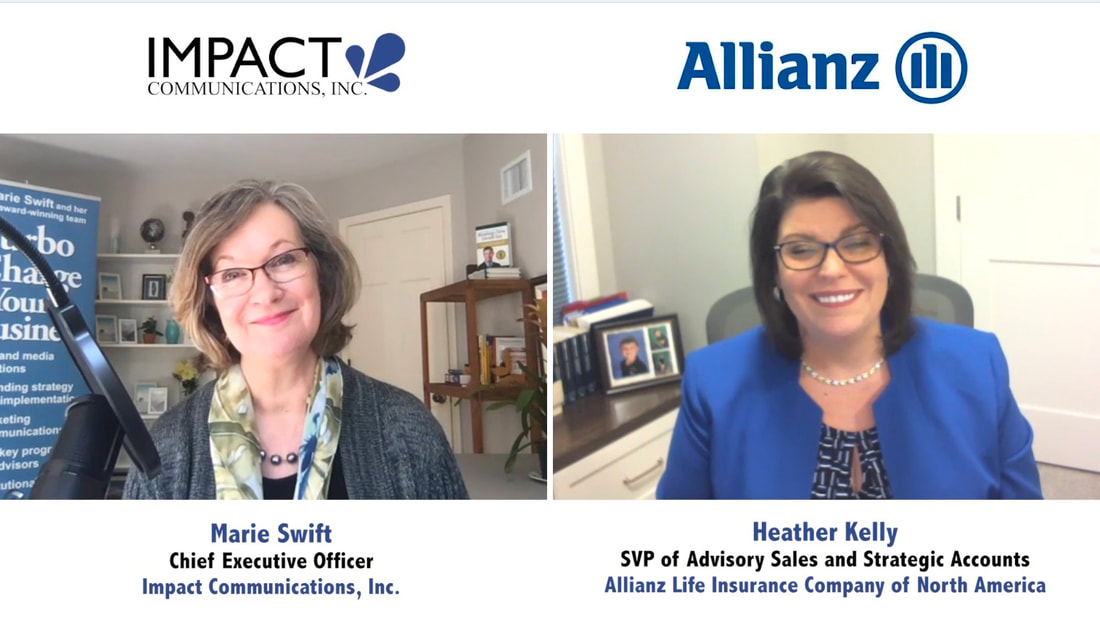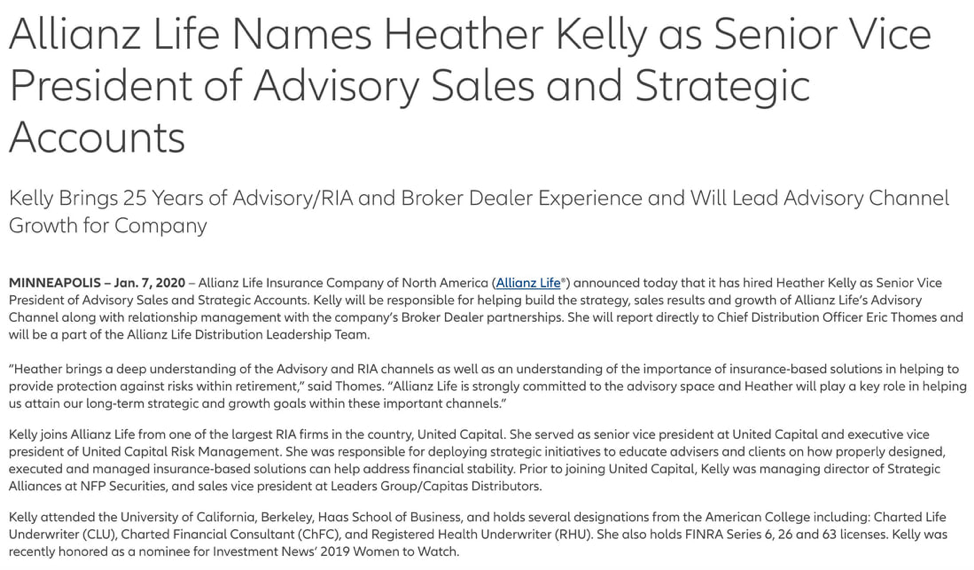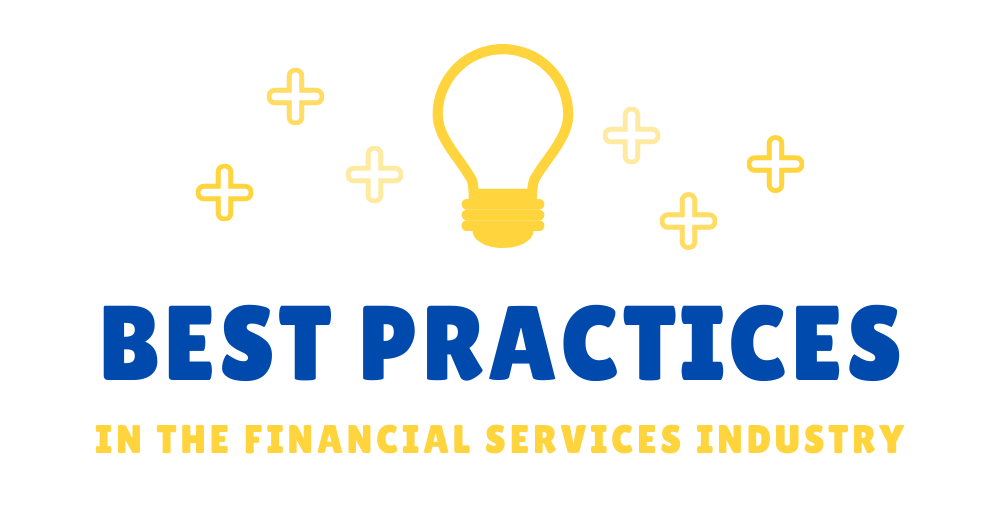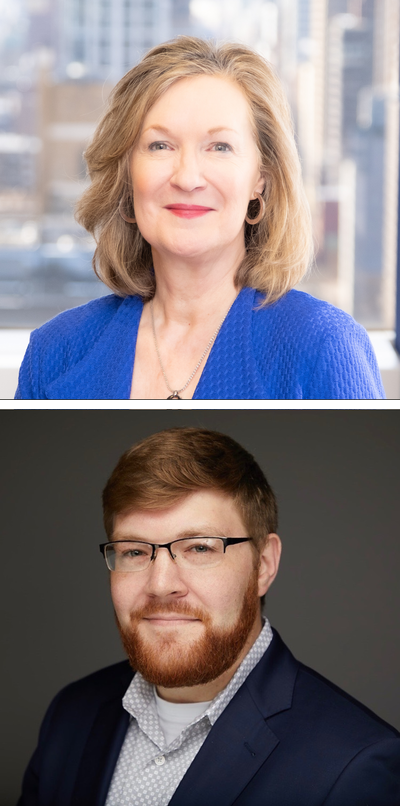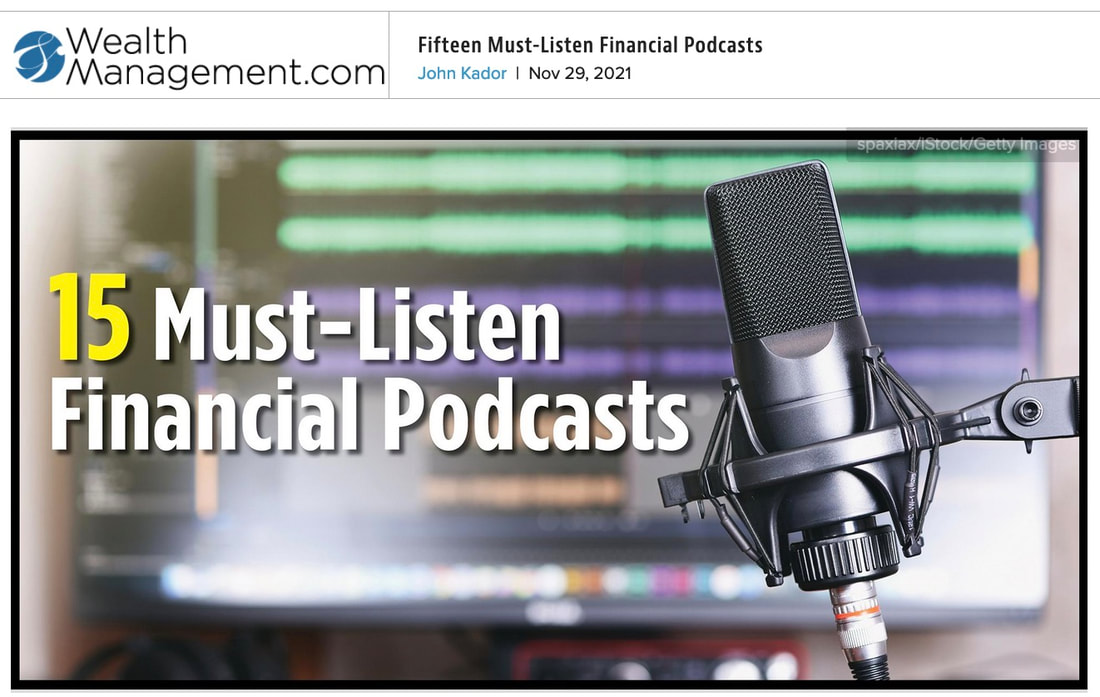|
In this Swift Chat video conversation, I speak with Heather Kelly of Allianz Life Insurance Company of North America. We discuss:
Impact Communications is writing a Special Report called “Conversations That Matter: Addressing Client Concerns, Hopes and Dreams During Uncertain Times.” The corresponding survey, which closed October 13, 2020, provided an opportunity for independent financial advisors to weigh in on 2020's pandemic and economic realities. Through the survey, 342 independent financial advisors shared insights and stories. We’ll be revealing in the corresponding report and a webinar via RIA Channel on November 20, 2020 what we learned, including:
The Swift Chat with Heather Kelly (both the video and the corresponding transcript) is shown below. Transcript of Swift Chat with Heather Kelly At Allianz, we're going beyond the borders, even just the traditional risk management products with the insurance wrapper, and recently came out with a Buffered Outcome ETF. Again, really just trying to keep those risk management solutions for our advisors and for their clients on the forefront so that they can have better tomorrow." ~ Heather Kelly Marie Swift: Well, hello everybody and you're joining me for another Swift Chat. Today's date is September 29, 2020. By now many of you probably know that I'm working on a special project that focuses on conversations that matter and how the playing field has changed for independent advisors since the world was turned upside down in early 2020. The survey results are really, really exciting, and I've been gleaning all of the golden nuggets from that survey. We're going to be working them into a special report and having some webinars around that. And in tandem with the survey and the comments that I'm getting from all of you independent advisors I'm interviewing some experts in this space. Editor's Note: On Friday, November 20th at 1:00 ET RIA Channel will host a webinar wherein Bob Veres of Inside Information, Shannon Stone of DHR Investment Counsel, Heather Kelly of Allianz Life Insurance of North America, and Marie Swift of Impact Communications will discuss the findings of the Conversations That Matter survey conducted by Impact Communications in September 2020. Registrants will be the first to receive a copy of the corresponding special report. Marie: Today I'm joined by Heather Kelly. Heather is with Allianz and, let's see Heather, give me your exact title so, I don't get it wrong.
Heather Kelly: Senior Vice President of Advisory Solutions and Strategic Accounts, Allianz Life Insurance Company of North America. Marie: That's a mouthful, so we’ll just say Allianz from here on. Heather's going to be my special guest today, and we're going to take the conversation further and talk all around this idea of how have conversations changed and what should independent advisors be thinking about as we look around the winter and the fall in 2020 and going into 2021? How are things likely to be similar, different? How does that occur for the experts that I'm interviewing and, in particular, with Heather Kelly? I’ve got a couple of other great interviews that we'll be sharing in the paper, including Bob Veres, Joel Bruckenstein, John Enright, Melanie Housden, Bonnie Sewell and Shannon Stone. But Heather, I want to make sure that we spend at least 15 minutes with you 20 minutes with you picking your brain. I'm looking at your LinkedIn profile and you've got a great history. You joined Allianz in January 2020, but before that you worked at United Capital for about eight years. So how fun was that to work with Joe Duran and team? Heather: Thank you, Marie. And hello everybody. It's great to be here today. My career has really been quite the journey. It's been an amazing journey. I started very early on at Guardian Life Insurance Company. It was in New York. Started one of their agencies and then got to go work in the big city, which was of course a big experience. But then as my career continued on, I migrated into the multi carrier environment, had really worked with banks and broker/dealers when they had just first started integrating insurance products into their offerings. And then fast forward a number of years, I had the unique opportunity to go work with Joe Duran at United Capital. And that was really an eye opening experience just to be on the inside the walls of United Capital and getting to see what an advisor's practice looks like firsthand and understand some of the biases, understand some of the history, but really understand how insurance and risk management tools can help amplify what they're extending to their clients to create better outcomes in the long run. Marie: And so today you are with Allianz and we’re pleased to have you with us. I want to talk about how things have changed. It's been a challenging year for advisors and clients alike with fear, stress, change, all of that has just been the common theme that we're all living through. And, you know, it's popping up in independent advisory practices and in homes. Clients are looking to their advisors to provide guidance and reassure them that during the market volatility and, hopefully, provide some income stability as they move through the accumulation phase of their life and into the distribution phase. They want to know that they're going to be okay. HOW ADVISOR/CLIENT CONVERSATIONS CHANGED IN 2020 So, let's start with this question. How do you think the advisor client conversations have changed over the course of 2020? Heather: Conversations have changed significantly. We are encountering challenges that we've never anticipated. And part of the value that an advisor delivers is that's what he or she does every day is their intent is to make sure that no matter what may present itself, that clients are prepared. And that's a very difficult job because we do not have a looking glass. We cannot tell the future; we're not fortune tellers. But there are times in our life that present themselves that just create unique challenges and they may be broad challenges like we have right now in the COVID environment that is impacting everybody. But then there are also challenges that impact are unique to each family; but again, it's things that we did not have the forethought to plan for—they just present themselves. It's been very interesting and there's been a sense of community, I think because everybody is going through this together. One of the challenges that advisors have had is oftentimes they're able to connect with their clients in person, just like normally you and I would be sitting next to each other instead of across a video camera and being able to have those impactful, meaningful conversations. But now we have to create that connectivity with clients over a video camera, or just over a telephone—it can create more challenges. There are certain cues that we can pick up in personalities and in body language that are just so much easier to hone in on when you're sitting there face-to-face than when you have to do it over a camera or even worse over just the phone, when you don't have that visual image that's attached to it. I think clients are also a little bit more trepidatious. I think that given the volatility in the marketplace, clients are at a different inflection point, especially many wealth advisor clients; they are really transitioning out of the accumulation phase and into the distribution phase, which has its own psychology attached to it because you’re no longer adding to the pot, you’re now drawing down from the pot and, well, ”Am I going to be okay?” is the question on their mind. “Is that pot of money going to sustain me to my lifetime? Am I going to have to alter my lifestyle?” There's just so many “what if” questions that an advisor walks the client through. And this environment has probably created even more challenges, and even made it more necessary to have the conversation because there are greater concerns. BOB VERES CALLS FOR MORE LIFE BOAT DRILLS Marie: Yes. You know, it's interesting. I was talking with Bob Veres yesterday for this project, Conversations That Matter, and one of the things that Bob said is (and I’ll paraphrase here): Advisors, we haven't seen the worst of this yet. The market recovered pretty quickly. And so, we've been living through more of a personal/social dynamic, where people aren't sleeping well. They have all sorts of concerns and complexities. But Bob is actually saying: Advisors, prepare your clients for a bear market and that we're not through the worst of this yet. We have a lot of challenges as a country and as a world. But Heather, the point that you're making is around the “sleep factor” and clients are at this inflection point and advisors need to be talking to them about what's important to them. How do they rest well at night? And how do they bring in the right kind of tools and solutions that are going to help them with that whole picture? So just like to get your input on that idea, that sleep factor? TODAY’S INFLECTION POINT / THE SLEEP FACTOR Heather: It's the, “I am okay?” factor. If I am okay, then I can sleep well. If I'm not okay, I don't sleep well, but I won't sleep well if I don't have an answer to that question either. I think advisors are feeling that too. They're in an environment that's new to them as well. So not only are they trying to navigate their clients through this environment, they're also navigating themselves and their teams because often the advisor is the leader of that team. So, it's not just him or her on an Island alone. There is a team that they're supporting. There's a culture that they're trying to continue in virtual world while delivering meaningful services to their clients. I do think though that we're at an inflection point that can create the opportunity for innovation because of the new environment and the new landscape and not having the same ground to travel over. It spawns innovative ideas, and it will bring new ideas to the forefront that we may not have thought of about a year ago. I definitely am a silver linings type of person. I think whenever adversity presents itself, oftentimes it also presents the opportunity to innovate and create meaningful change that will last not only during the current crisis, but for years to follow. Marie: Yes. You know, what's interesting. Some of the early survey results are showing that the deeper conversations, the more human and advisor is, the more that they “get” their client—"I know you, I care about you”—the better the relationship. It's not about the expertise anymore. It's that deep human connection that advisors have really gone the extra mile to reach out to their clients, to take a personal interest, even to the point of delivering toilet paper and Clorox wipes during the worst of it when people couldn't get supplies, having home delivery meals to the people, or just calling them. Because there clients, some of them are lonely and afraid. And so, the advisors in the survey are telling us with real data and real stories that this makes a difference. And they're also getting referrals. Their clients are feeling secure in the relationship and they're referring their friends and family members because of that level of care. So, I think that's what you're talking about here, is that relationship. Heather: Absolutely. It is one of the true differentiators that an advisor has technology tools are really ubiquitous on the landscape and many advisors can avail themselves of the same tools, strategies, and technologies that the advisor next door is using. Their differentiator is their connections with their clients, that emotional intelligence that they bring to the table. That was what I was referencing earlier, by being able to pick up on the cues, knowing their clients, knowing when something just isn't right, being able to ask those inquisitive questions to peel back the layers to get to the root of what's concerning the client. ADDING TO THE ADVISOR’S TOOL BELT Marie: And so back to the tool belt that the advisor needs to have, and just thinking about how the world has changed, but also you mentioned innovation and how product providers are innovating with the times. I know Allianz is doing some great work in this regard. Let’s talk about risk mitigation and products today and address advisers who may want to open their eyes to some of the new products. Heather: I do think that we're in a unique position. It's interesting, Marie, when I decided to migrate over to Allianz, I never envisioned a COVID crisis. I kind of knew that there was a presidential election coming up (ha!). So, the markets might be a little topsy/turvy, but I definitely didn't anticipate the worldwide pandemic. Even when I was at United Capital, there were many of my advisors who would approach risk management tools, particularly if they were in an insurance wrapper, and may have approached them with an existing belief factor such as: “I just don't believe in insurance. I don't think it's the right solution for my clients.” And really the conversations that I would have with those advisors and the education process that I would take them through, and my team would take them through, is insurance isn't a religion. It's not something you should believe or not believe in. “We're going to take the tools out of our toolbox. We're going to bench test them, using the tools that they use with their clients, whether it's the eMoney, MoneyGuidePro or whatever planning software that they might be deploying and see if it amplifies a client’s situation. If it does, then it's something we should present to the client to actually implement. If it doesn't, then we know that we've taken all the resources that are available to us and did our fiduciary responsibility and bench tested them inside the client's plan. With that thought process in the back of my mind, and looking at the products that Allianz has come to market with: We're going beyond the borders, even just the traditional risk management products with the insurance wrapper, and recently came out with a Buffered Outcome ETF. Again, really just trying to keep those risk management solutions for our advisors and for their clients on the forefront so that they can have better tomorrow. Marie: Yes. It seems like closing your mind because of a notion that you had many years ago, isn’t wise. Kind of like Buick, right? It's not your grandfather's Buick anymore. An annuity that you might've looked at before is not the same annuity that is available today. And plus, I know Allianz has been meeting advisors where they are. So, if they're an independent advisor, they don't need to change their business model in order to take a look and to model some of these products and to at least consider them. So, could you talk just a little bit about how Allianz is supporting advisors from a service perspective? MEETING INDEPENDENT ADVISORS’ NEEDS Heather: Absolutely. So, because we have the mindset that we really are in a renaissance for risk management, and we do want to meet the advisor where he or she lives and in their business model, we also realize that insurance when integrated into a plan is always going to be better than layered on top. And oftentimes when those advisors are thinking about those insurance products that they've encountered previously, that might not have been the best path for the client at that time, oftentimes that product was just sold. It wasn't part of the planning construct and it wasn't integrated in; it was layered on top. Really with anything. When we have something that's integrated in, it's always going to perform better than one layer on top of that. Any assets that a client might own. If they just buy it on the sidelines and it's not really part of the overall investment strategy or the financial plan, it's not going to have as great of a result as if it was really part of the methodology and part of the planning process. So, with that, Allianz has taken a step back because we realized that we're serving an advisor that's a little bit different than what our previous financial professional may have looked like, and they don't have the expertise and they don't have the acumen when it comes to the institutional knowledge on the insurance side. So, we have set up a couple of teams inside the walls of Allianz to really help bridge that gap and the education with the advisor. The first would be our FinTech team. Those folks are team inside the walls of Allianz that are really there to just work with the advisors, that power planners or anybody inside their office who are looking to integrate the insurance products inside whatever planning software or risk management software they may be using. Another team that we have available to them is our advanced planning. We do realize that many, especially in the independent advisory space, they don't have the in-house attorneys and CPAs and expertise available and accessible to them. So, we've built that team. So, if they have a tax problem in estate planning problems or need to speak with an LLM or a CPA about something, that's an advanced strategy, we have those team of experts. We have also stood up the last team, which is our RIA team and really what that team is there for is to help educate advisors, walk them through the solutions that we're bringing to the marketplace. But most importantly, understand their business model, understand the vernacular, understand their level because we have all levels of vacuuming on that side of the business. There are some folks who are in the advisory community, who came from the insurance side of the house, and we have folks who've never had an insurance license previously. So being able to have the finesse to talk to the advisor at the level that they're accustomed to too, and that's going to resonate with them is really important. So, we've made sure that we've brought on folks who are keenly adept on the Allianz product side, but most importantly are able to train, teach and speak with the advisors in their language instead of an insurance nomenclature. BRIDGING THE GAP IN CLIENT CONVERSATIONS Marie: What about talking to the clients? How can advisors explain some of these products in a way that clients understand? If, say, they want to recommend a client, consider an annuity or a Buffered Outcome ETF? Heather: I think it comes back to every product that they have in their toolbox. When they keep it relatable to the client and they talk about what the individual product or solution does for that particular client and how it amplifies that client's likelihood of positive outcomes. It's just a different dialogue – and we don’t need to get into technical jargon. Definitely you want to be able to have them peek behind the curtain as deeply as they'd like. I'm a firm believer the more they know the better, but it's just having that intuitiveness when you're working with a client. There are some clients who are going to want to know every little nook and cranny and understand every aspect of a product. And then there are other clients— I think about myself and my own financial advisor. “Andrew, do you think I should do this? And you think this is the right path? Share two or three reasons why.” Give me the conviction and I have a lot of trust and confidence in my advisor and many clients do as well. Again, it's being able to know your client, know how to speak to the client and keeping it simple and staying away from the jargon that we sometimes default to. Marie: Yes it's really just having that collaborative conversation. I recently went to see my doctor for the first time since the lockdowns. We were sitting across the room with our masks on and keeping our distance and having a conversation about my health and should I go to the dentist to have a routine procedure done. We decided together what to do. So it occurs to me that many independent advisors see themselves in that role. They're collaborative with their clients. They have an idea of what would be good. Like my doctor knew what would be good for me. And she said, “Don't go to the dentist right now, Marie. You don't care about that in the grand scheme of things right now.” But, you know, it's that kind of collaboration where the advisor and client can figure it out together. And that basis of understanding is: “Why does this make sense? And how could it help in the overall health of a portfolio, a financial plan or personal health?” Heather: Very true Marie, very true. There are definitely a lot of parallels between doctor visits and visits with our financial advisor. OPTIONS FOR LOOKING UNDER THE HOOD Marie: So, is there anything else that you want to say about how Allianz is supporting RIAs and independent advisors? I know you've got products for fee-only advisors and there are billing solutions and modeling solutions. What more would you like us to know? Heather: I'll go back to a comment that I made earlier. I encourage advisors to peek behind the curtain. The more they know, the better educated they are, the more comfortable they are with having these conversations with clients. I think, oftentimes, an advisor may steer away from the insurance conversation because of historical experiences, as you referenced before, or just the unknown. I wouldn't be sitting here talking to you today, comfortably and confidently, if I were talking about a subject that I didn't know about. So, inside the walls of Allianz we want to make sure that we're giving the advisors the resources so that they're comfortable. So, if they want to speak to our hedging desk, if they want to talk to an actuary, that’s great – and I've had some advisors want to do that. They really want to understand the inner workings so they're competent and comfortable with the products that are being recommended. We have those services. Again, we've tried to create the plug-and-play so we can meet the advisor where he or she lives and really deliver the services that are going to be meaningful inside their practice but most importantly, at the end of the day, create better outcomes for the client. Marie: It's great to hear how Allianz is helping with all of this and product solutions for independent advisors. In closing Heather, I'm wondering how our listeners, our viewers, can learn more and get the help that you're offering regarding the modeling, the products and just, you know, looking underneath the hood. So where would they go to learn more? Heather: So, we have [email protected], which is an email that they can email. We also have www.AllianzLife.com/AdvisorySolutions that they can go to. They can check out our portfolio impact report. They can find out about our products and our solutions that we're offering. Really having a conversation, a meaningful dialogue. Just like we look to have with our clients, a meaningful dialogue and a meaningful conversation will go a long way. So, I encourage them to go out to the website and just peek behind the curtain. Learn a little bit more, have the conversation. All advisors have integrated new products at some point in time into their practice. It's just taking the time to educate themselves and understand how this may or may not fit for their clients. Marie: Well, with that, Heather, thank you. It's been a great conversation. I really appreciate your being here today. Heather: Thank you, Marie. Comments are closed.
|
About
|
|
Stay Connected
|
Phone: 913-649-5009
©2023 Impact Communications, Inc.
|

